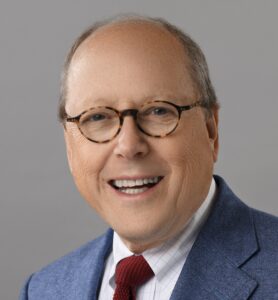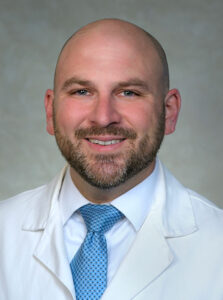Arthritis Foundation Establishes Dr. Herbert S.B. Baraf Award for Excellence in Arthritis Care
In October 2022 at its annual Commitment to a Cure Gala, the metropolitan Washington, D.C., chapter of the Arthritis Foundation presented its medical honoree, Herbert S.B. Baraf, MD, FACP, MACR, with the inaugural eponymous Dr. Herbert S.B. Baraf Award for Excellence in Arthritis Care. The founding member and former managing partner of Arthritis and Rheumatism Associates, PC (ARA), Dr. Baraf says the award was a surprise to him.
Reflecting on his nearly five decade-long career—encompassing the establishment of a thriving private practice, academic appointments and participation in more than 400 clinical research trials—Dr. Baraf notes that his enthusiasm for medicine never waned from the moment he chose to pursue a medical career. After witnessing a fatal motorcycle accident, he eschewed family expectations that he would pursue a career in law. In his sophomore year of college, he changed his focus to pre-med and never looked back: “My enthusiasm for medicine deepened the more I immersed myself in training,” he says.
Dr. Baraf obtained his medical degree at SUNY Downstate Health Sciences University College of Medicine, New York; completed his internship and residency at The George Washington University Hospital, Washington, D.C.; and followed that with a rheumatology fellowship at Duke University Medical Center, Durham, N.C.
Early in his time in private practice, Dr. Baraf recognized that the ability to deliver high-quality patient care meant the practice itself must be kept healthy. “I entered a very competitive marketplace. I valued every patient encounter and saw each relationship as a brick in the edifice of the building of the practice,” he says.
In addition to providing attentive and expert medical care, Dr. Baraf quickly began to grasp that each aspect of the patient’s interface with the practice must be attended to, from the initial phone contact to reception to billing to keeping the lights on. “I became very interested in how you manage both the patient’s experience and the economic pressures imposed by government payers and the insurance industry,” he says.
Reflecting on his approach to patient care Dr. Baraf says, “It’s important that rheumatologists remember their primary focus is the patient… how their disease affects them, and how to jointly achieve the goal of improving their quality of life in all domains.”
By the time Dr. Baraf left the practice, ARA had grown to encompass seven offices in Maryland, Washington, D.C., and Virginia, incorporating 25 physicians and 15 physical therapists.
Dr. Baraf is renowned for his expertise in practice management and has lectured and written widely on ways to maintain a healthy practice. His work in clinical research, especially in the management of gout, has played an important role in the advancement of the specialty. He has also presented his work on gout, rheumatoid arthritis, osteoarthritis, ankylosing spondylitis and the safety of non-steroidal anti-inflammatory drug therapy in dozens of peer-reviewed publications and at national and international meetings.
In 2014, Dr. Baraf was recognized for his work by the ACR when he was awarded the Paulding Phelps Award for “outstanding service to patients, community, and the practice of medicine.” At ACR Convergence 2022 he received the Innovation in Clinical Care Award.
Since his retirement, Dr. Baraf continues to keep a busy calendar, retaining his appointment as a clinical professor of medicine at George Washington University and teaching rheumatology fellows at the National Institutes of Health, where he advises young rheumatologists to keep their options open. During his own fellowship, he says,
“I wouldn’t have predicted my career trajectory. You never know where your interests and abilities will take you.”
Mathieu Nelessen Named CARRA CEO
In January, Mathieu Nelessen became CEO of the Childhood Arthritis and Rheumatology Research Alliance (CARRA), a network that formed in 2002. Mr. Nelessen comes to CARRA following an active career with several well-established nonprofit organizations. He spent a decade with the American Red Cross, beginning with the New Jersey chapter and recently having served as vice president of business strategy and planning, biomedical services. He previously was executive director of the New Jersey Chapter of the American Diabetes Association and has also served with the Special Olympics.
We spoke with Mr. Nelessen in December 2022, as he was preparing to take the reins as CEO. “It’s absolutely thrilling,” he said of his new post, “and the most compelling aspect of
CARRA for me, personally, is its focus on very specific and rare pediatric rheumatic diseases. My time at the Special Olympics helped me to bring deep attention to a singular mission.”
Mr. Nelessen’s quest as he embarks on his new appointment is to “listen and learn and try to deeply understand what is the ‘art of the possible.’” His initial “listening tour” included familiarizing himself with the realities of the pediatric rheumatology field.
According to the ACR, over 300,000 children are affected by these diseases, and yet, as Christy Sandborg, MD, professor of pediatrics (rheumatology) emerita, Stanford Medicine Children’s Health, has pointed out, only 60% of medical schools have a pediatric rheumatologist. From its formation, CARRA has focused on addressing the unmet needs of children with rheumatic disease. Its network supports investigator-initiated studies to help build an evidence base for effective care. The CARRA registry includes 72 CARRA sites and has enrolled over 10,000 children with rheumatic disease (i.e., juvenile idiopathic arthritis, systemic lupus erythematosus, juvenile dermatomyositis) since reopening in July 2015.
Mr. Nelessen says he will be searching out opportunities for strategic alliances with other organizations, “with a collective view to really change and continue to drive different outcomes for this disease state.”
Ethan Craig, MD, MHS, Named Vice Chief for Clinical Affairs at the University of Pennsylvania
In August 2022, Ethan Craig, MD, MHS, an assistant professor of clinical medicine, Division of Rheumatology, the University of Pennsylvania, Philadelphia; a rheumatologist at the Corporal Michael J. Crescenz VA Medical Center; and a past associate editor of this publication, added a new role to his résumé. He became vice chief for clinical affairs in the Division of Rheumatology.
His main challenge in the role, he says, is to balance how to equitably and effectively deliver care to patients “despite the workforce shortage in rheumatology.” One way to achieve this goal, he says, will be to triage patients’ cases, using advanced care practitioners, such as nurse practitioners and physician assistants, to handle follow-ups with stable patients. That would free up rheumatologists to see new patients and those with complex conditions.
Dr. Craig notes that a third of his time is devoted to clinical care at the VA. With a new child, he has stepped back temporarily on additional duties. What he finds most compelling about rheumatology as a subspecialty are the key elements that first attracted him to choose the field: the complex puzzles of disease presentation and the ability to improve patients’ lives.
Although he characterizes himself as a late decider—having first considered specializing in neurology or infectious disease—he recalls a coincidental rotation in his internship year at the University of Minnesota clinched his choice of specialty. “I was assigned to the rheumatology service for a month, working with Elie Gertner, MD, FACR, head of internal medicine/medical education, at Regions Hospital, and completely fell in love with the complexities of rheumatology patients there.”
In addition, Dr. Craig says enthusiastically, advances in disease management—and not just the exciting biologics—give rheumatologists the ability to make “a huge difference in people’s day to day quality of life and functioning.”
Gretchen Henkel is a health and medical journalist based in California.


